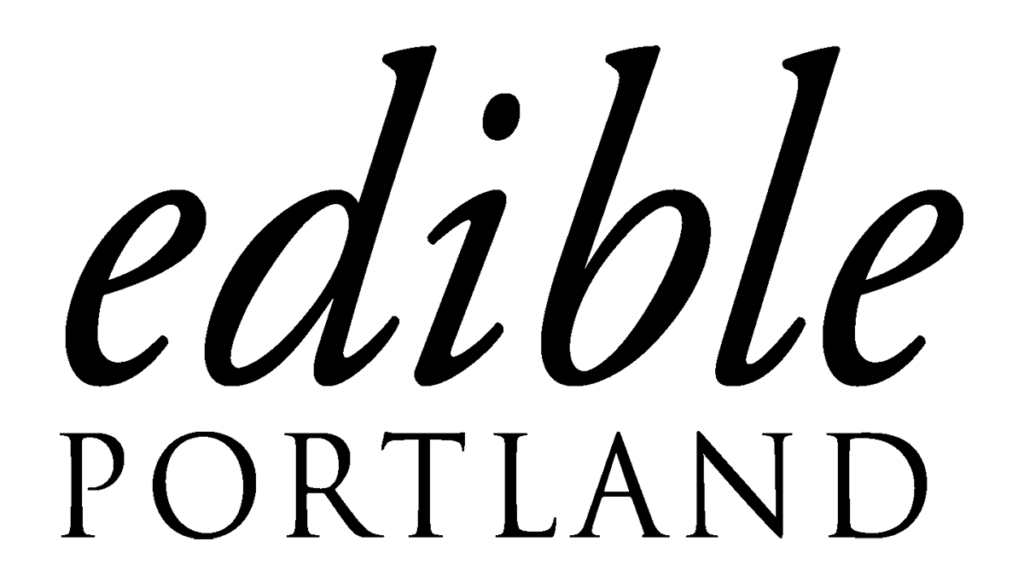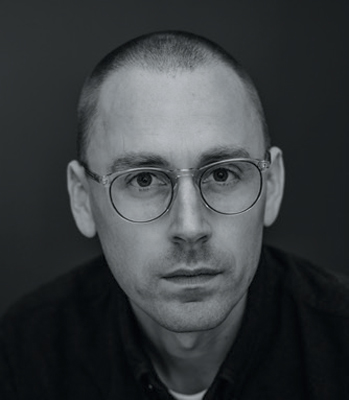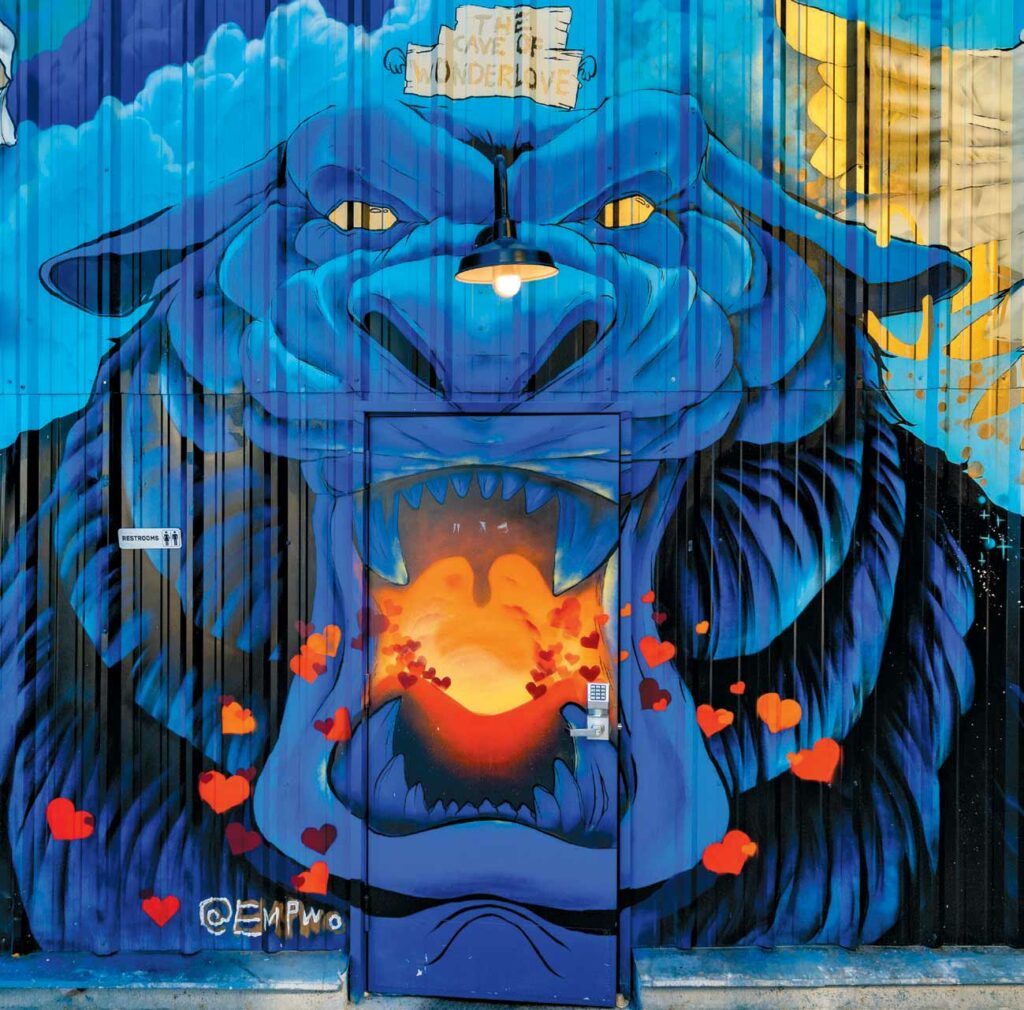
PHOTOS BY MIKE GASKINS
Imagine Disneyland or Willy Wonka’s Chocolate Factory if they had been designed with a broader, subtler, more urban, and more mature sensibility. That’s the cohesive reality you’ll enter when you visit WonderLove, a food-cart hub and cultural destination on the Central Eastside.
Come for lunch, and you may stay for the afternoon. Time has a way of waiting politely outside the walls of WonderLove. Clocks and schedules have no place in leisure, pleasure, or wonder, the domains in which WonderLove resides. The space invites you to linger or come and go as your whims determine. The food trucks, selected for quality and variety from dozens of applicants, orbit a central mass of tented picnic tables strung above with lights like stars. To the south stands WonderLove’s pièce de resistance, a two-story bar assembled from shipping containers with rooftop seating offering an iconic view of downtown and, if you time it right, the sun setting over the West Hills.
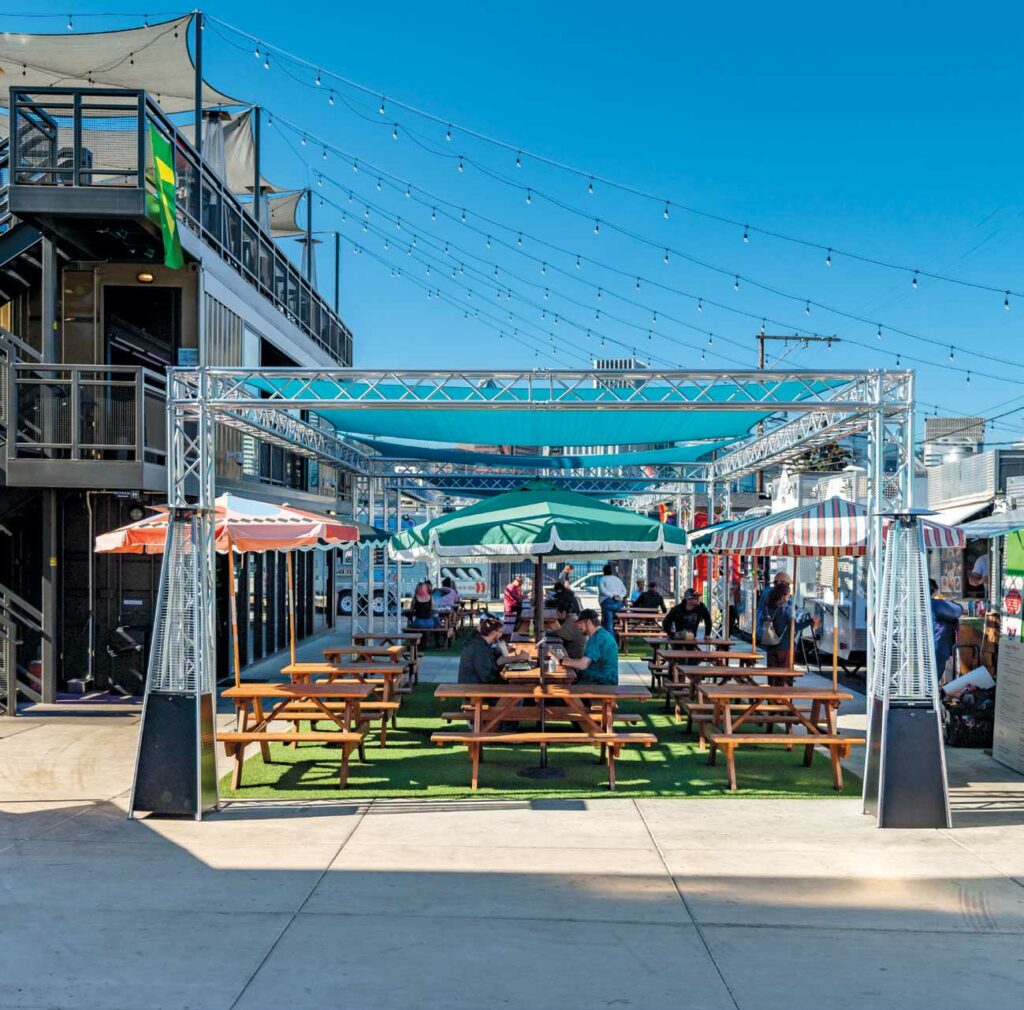
The cosmic vibes aren’t coincidental. A mural on the outer west wall on Southeast Second Avenue depicts a Big Bang–like moment of creation that reflects the revitalization that WonderLove represents to its neighborhood, a revitalization that was far from assured when Joel Beaudoin and Michael Morrow began laying out plans to develop the block.
It was early 2021. The chaos of the pandemic and its fallout was inescapable. Violent crime was spiking. Reports of businesses shuttering competed for attention, with reports of businesses being burgled. The meanings of riot and protest had escaped reality for the simpler realm of ideology. Those who weren’t scared to leave their homes for fear of getting sick were growing increasingly scared to leave their homes for fear of what they might encounter. Tent encampments were proliferating. The experiment with decriminalization was yielding its results: drugs and paraphernalia were passed around in plain sight; men and women could be seen staggering across streets and nodding off on benches and sidewalks. In short, the city that had been Morrow’s home for nearly three decades and Beaudoin’s since always was suddenly not the city they had thought of as theirs, and they wanted that to change.
To see the space now is to see it transformed. From the outer walls, including a public wall for street art, to the various inner walls and building exteriors, art is prominent at WonderLove, art of a particular style: vibrant, bold, celebratory, and impossible to ignore. A mural of black and white hearts within hearts is large enough and high enough on WonderLove’s office building to be seen from downtown. A simple stroll to the bathroom (i.e., the Cave of WonderLove) involves passing through the mouth of Munta Eric Mpwo’s fierce blue lion. Portland artists such as Mpwo and the Pander Brothers ensure that we take a moment or several to look around and feel good about where we have arrived. If there were a soundtrack to this experience, it would be Kanye West’s Graduation.

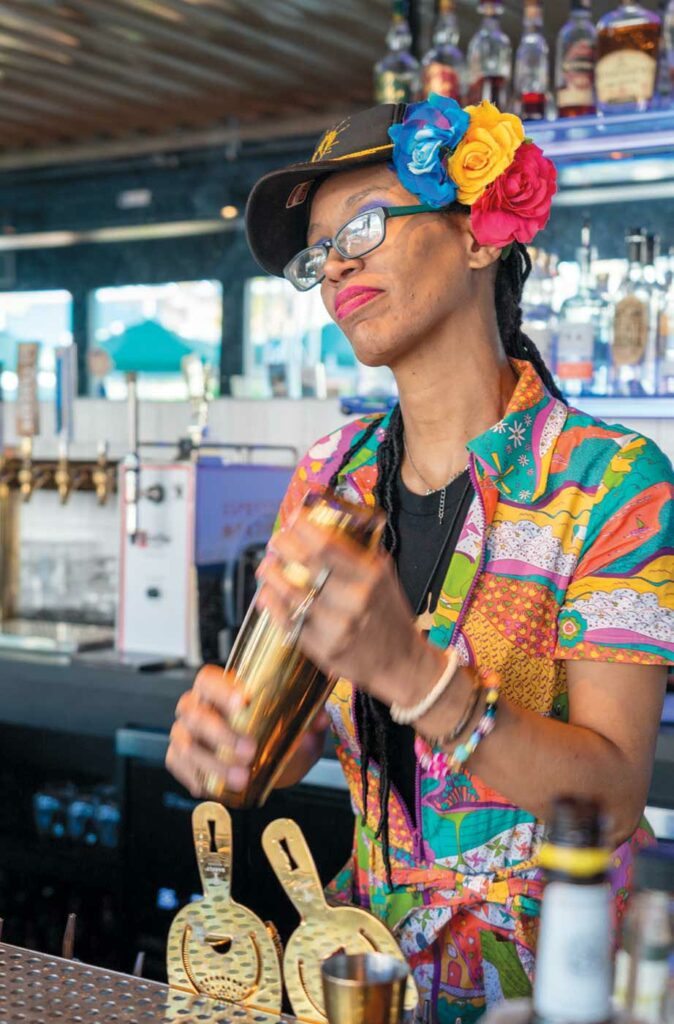
I felt pretty good the first time I immersed myself in the vibes of WonderLove. My group, a mix of adults and children as young as two, was seated at a shaded picnic table on a sunny day, enjoying food from around the world. By the time we finished, we had all tasted pizza (Wondercat), Guyanese (Bake on the Run), Indian (Platter Division), Greek (Gyro Bistro) and waffles (Honeycuspe). We found no duds. The same was true of the drinks. The splendor of Northwest beers is well represented. In addition to cocktails, WonderLove serves kombucha and other nonalcoholic options.
All of this has come together, as Beaudoin and Morrow could have hoped. “People thought we were out of our minds to try this three years ago,” Morrow told me. “And we were! This was nuts.”
There was a dismal civic spirit to overcome numerous delays and unforeseen logistical obstacles. Luckily for them, they didn’t know what they were getting into. When doubt crept in, it was too late; they were already committed. So even as they were “staring at dirt and concrete with an idea,” as Beaudoin recalled, “wondering how we were going to pay for this,” there was no choice but to proceed.
The rest, as they say, was hard work. Beaudoin and Morrow secured funding on a property they liked on Southeast Main between Second and Third Avenues, only to have the bank pull out ahead of closing. When, in late 2021, another bank offered a hard money loan, Beaudoin and Morrow were forced to accept stricter and more burdensome terms. The following two years were a snarl of contracts, permits, more loans, more permits, rising material costs, and halting construction that gave Beaudoin and Morrow plenty of time to second guess the wisdom of their venture. But they responded to each subsequent challenge with what Beaudoin calls “the entrepreneurial mentality. We just kept asking ‘What’s next? What’s next?'”
Nicole Whitesell, founder of women’s clothing boutique Adorn, might have anticipated such commitment when she introduced her two friends through the Portland chapter of the Entrepreneurs’ Organization. Each had expressed to her a vision for a food-cart pod that wouldn’t just serve food but become, in Beaudoin’s words, “something that revolves around the whole shebang, a space people can look at and be in awe.”
WonderLove was finally realized in the summer of 2024, opening ten food trucks, accompanied by recreational games like ping pong, cornhole, giant Connect Four, and even basketball by day, and an outdoor stage for concerts and parties by night. In the fall, WonderLove added an indoor warehouse venue that hosts regular events.
The name was Morrow’s idea. It came to him as epiphanies do: in a flash, during a moment of relaxation following concentration. “What to call a creative oasis, where adults can, like children, be curious and available to awe?” he asked. “How to express and celebrate a sense of passion for one’s projects?” And then—aha! WonderLove.
Soon after, Murrow found support for his intuition in Monica C. Parker’s The Power of Wonder, which proposes that a sense of wonder is a better, healthier life pursuit than happiness. Unlike happiness, she argues, wonder leads us beyond ourselves into the world. Yes, Morrow thought, into the world and into a space where creative energy, passion, the pleasures of food and drink, art and people, a sense of beauty, wonder, and love all converge—into WonderLove.
Between the Doug Fir’s upcoming relocation to Morrison and the success of the Portland Night Market nearby on Alder, between OMSI’s plans for expansion and the development of a new Live Nation venue in the neighborhood, there is a resurgence sweeping the Central Eastside. WonderLove is at the heart of it.
And the view from the heart is good: Portland looking to all eyes like Portland itself, the place you’ve seen in photographs, the place you’ve read about, the place you remember, reimagined.
